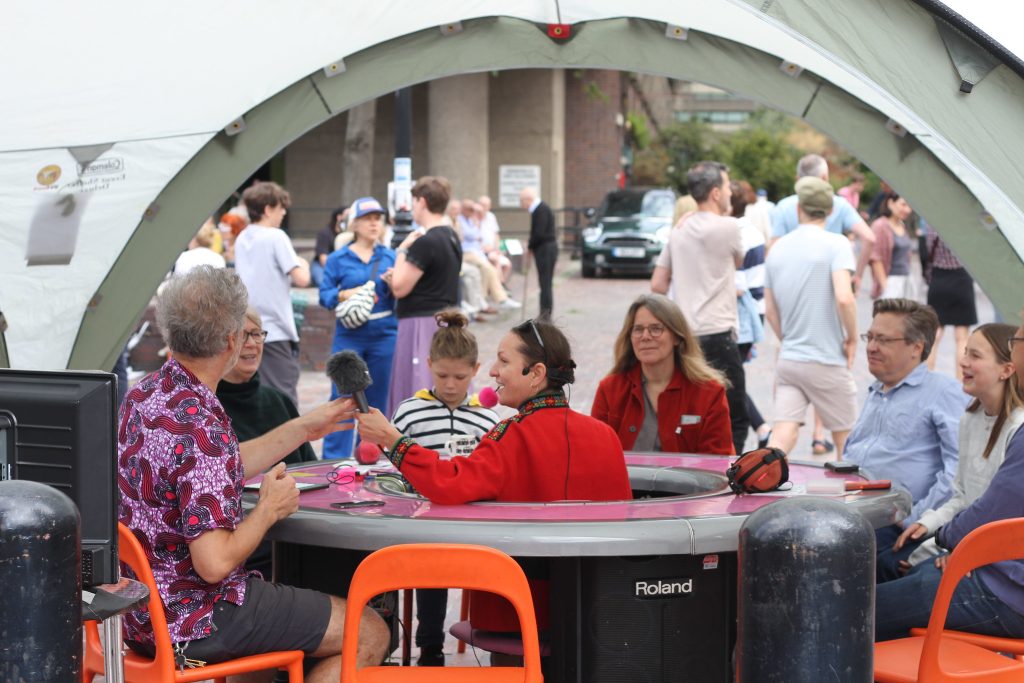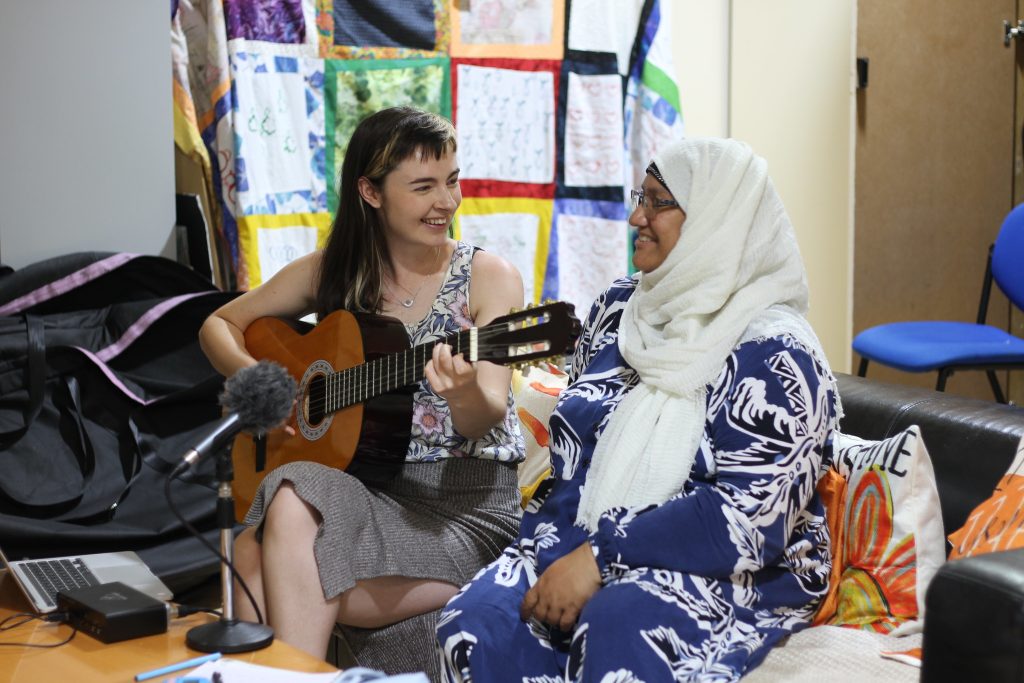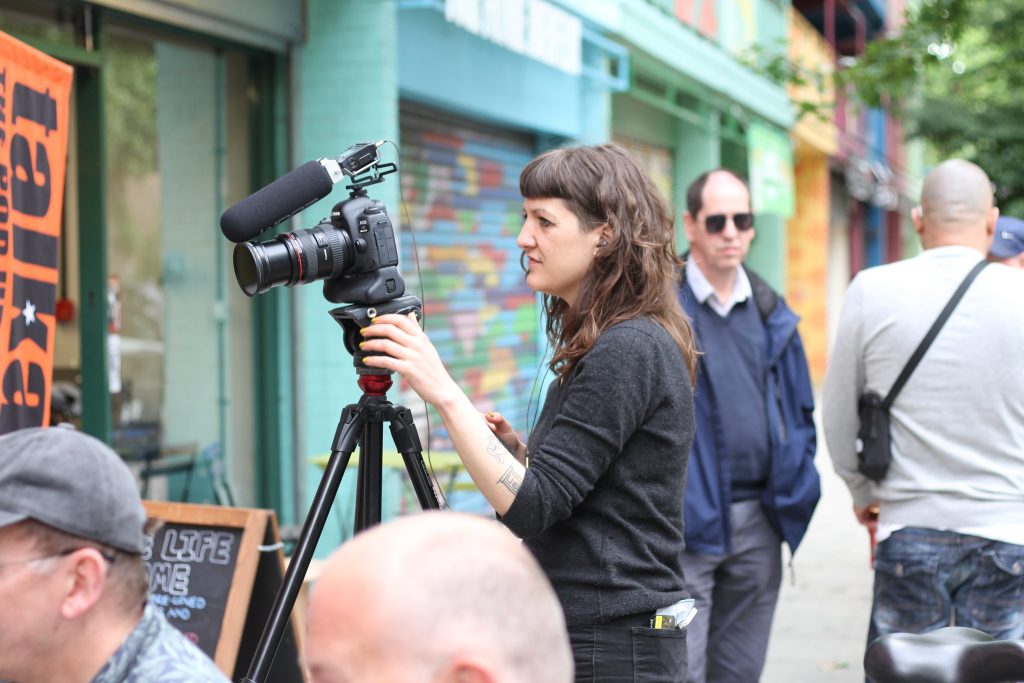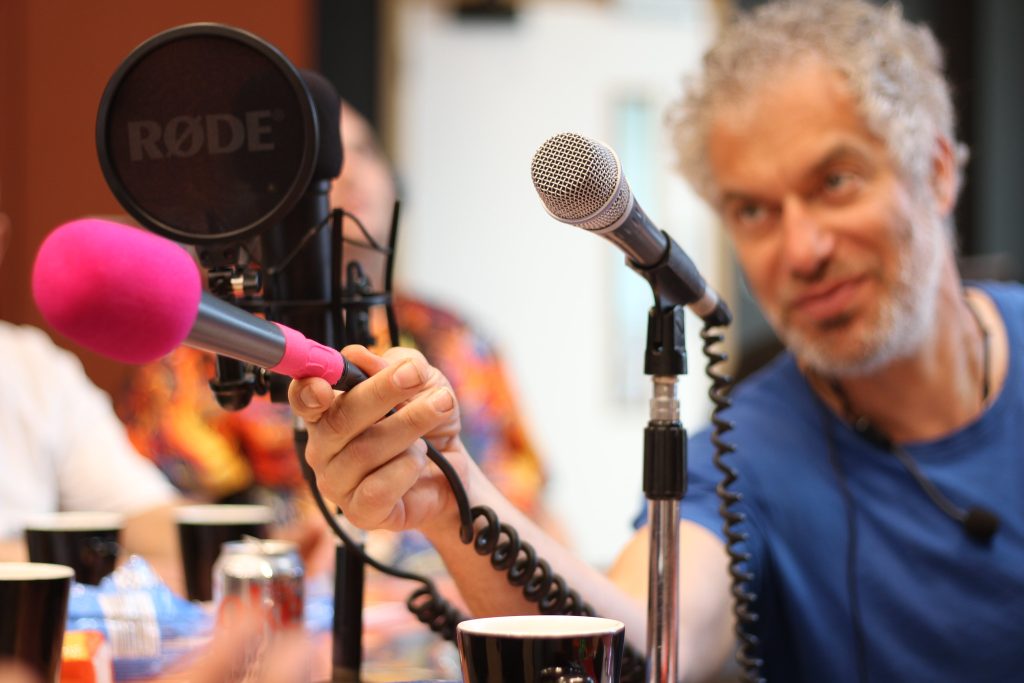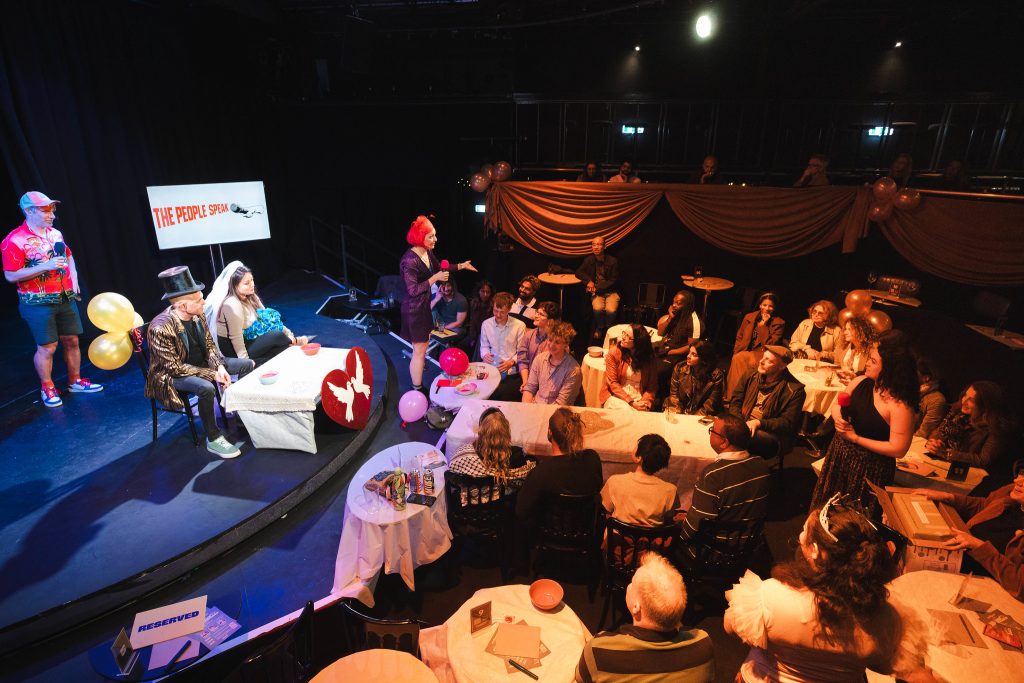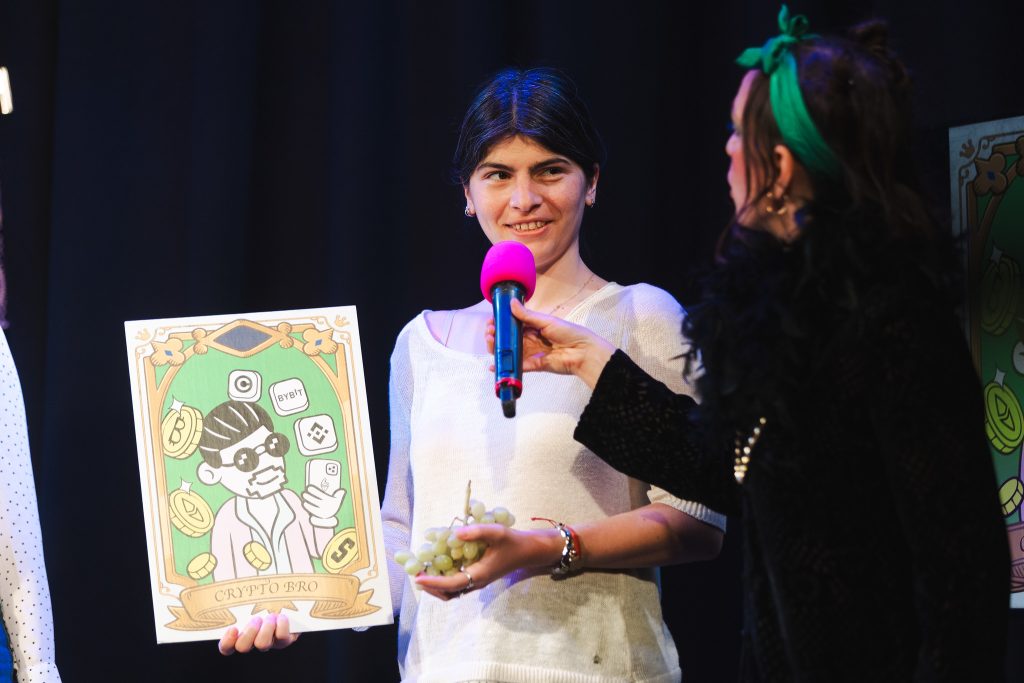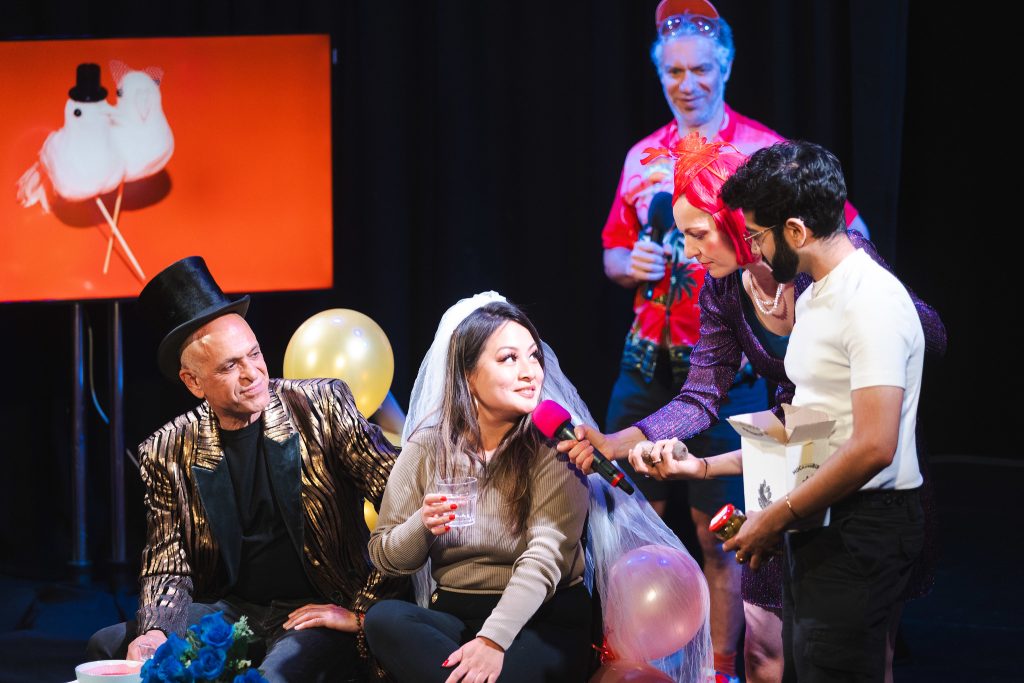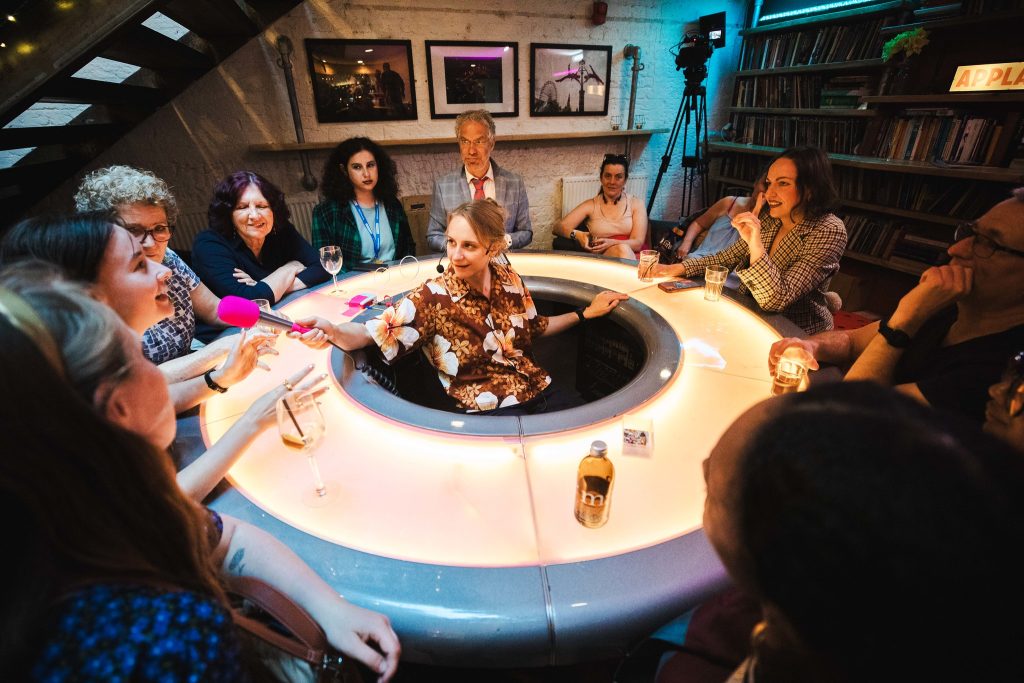Aberfeldy Stories: A People’s Art School on the Street 7 Oct 9:18 AM (12 days ago)
“Come in and chat” – that simple sign on our studio door in Aberfeldy Street has sparked something extraordinary. Over six transformative months, curiosity turned into creativity, conversations became performances, and neighbours became storytellers.
200 People. 5 Films. 20 Podcasts. One Anthem and a Computer Game
Between March and September 2025, Aberfeldy Stories showed what happens when you give people the space, skills, and support to share their narratives. The results? Over 200 residents stepped through our doors and left with:
- 5 short films that capture the heart of our neighbourhood
- 20 podcasts brimming with local voices and perspectives
- Stand-up comedy routines that turned personal experiences into laughter
- Written and performed stories shared with courage and creativity
- A computer game designed by local imaginations
- The Aberfeldy Anthem — written and performed by residents
More Than an Oral History Project
“Initially, we thought it would be more of an oral history project,” says Mikey, “but we found that people’s personal experiences were much more vivid for them. By putting on workshops, we not only created a vehicle for those stories to come out but we also gave people skills to shape them — be it through podcasts, films, or poetry.”
Our late friend John Baker called The People Speak studio “a people’s art school on the street,” and he was absolutely right. For nine years before Aberfeldy Stories even began, we’ve been running our open studio and events, building trust, laying roots, and getting to know our community deeply.
“We love East London,” says Margot, “but it can be such a transient city, making it hard to lay down roots and get to know the local community. We feel fully accepted and grateful to have made lasting connections.”
Building a Dream Team
The support from Aberfeldy Big Local allowed us to do something special: train a new generation of socially engaged artists in The People Speak methodology. Our team grew to include:
- Helena Bloch — applied theatre practitioner leading drama and storytelling workshops
- Jo Elise — singer-songwriter creating the Women’s Sound Circle and composing the Aberfeldy Anthem
- Lewis Bryan — established stand-up comedian and workshop facilitator
- Evi Hall — podcast producer launching our new podcast series
- Ameron Randhawa – game designer behind the ‘Fast Food and Furious’
- Claire Nolan — filmmaker capturing it all on screen
Creating Space for Every Voice
Working with MIND Tower Hamlets, we welcomed people on recovery pathways who overcame personal challenges to get involved. Together, we explored how comedy, writing, and storytelling can transform personal experiences into compelling performances.
When we realized quieter voices needed their own space, Republic.London immediately offered their beautiful venue for our Women’s Sound Circle, where new songs and gentle connections flourished. (Exciting news: Republic will be hosting a new series of workshops by Aberfeldy Stories artists!)
What We Actually Did
- 5 creative courses led by local talent (stand-up comedy, podcast production, music-making, filmmaking, drama & storytelling)
- 8 taster workshops for local groups including Feldy Fellas, Link In Men’s Groups, Spotlight youth centre, Burcham Gardens, and MIND Tower Hamlets
- 10 live events including our pop-up talk show Talkaoke and a showcase at St Nicholas’ Church attended by over 70 people!
It all started around the Talkaoke table — our signature format where conversations flow freely and everyone gets a turn at the mic. From there, we co-created a program that gave people real skills and platforms to share their stories their way.
This Is What Community-Led Creativity Looks Like
“We would not be able to do this without the support from our local partners who say yes to a lot of our ideas — even if we can’t tell for sure what the outcome will be,” says Margot.
After 28 years of developing our creative craft and nine years of building relationships in this neighbourhood, Aberfeldy Stories represents everything we believe in: that everyone has a story worth telling, that creativity is a tool for connection, and that when you create genuine space for people, magic happens.
Aberfeldy is unique because of the individuals who live here. With Aberfeldy Stories, we’ve finally shone a light on them.
Aberfeldy Stories was supported by Aberfeldy Big Local. Special thanks to our partners MIND Tower Hamlets and Republic.London.
How we (almost) married Pedro and Viola at the Barbican Summer Party 5 Sep 5:58 AM (last month)
Why letting conversations flow naturally reveals the heart of a community
A Perfect Day for an Impromptu Wedding
Everything was ready: the bride and groom, the dress, the sunshine, and plenty of willing guests. What we didn’t expect was that our afternoon discussion about the future of the Barbican and Golden Lane estates would turn into wedding poetry and creative neighbourhood activation. But that’s exactly why we love The People Speak approach – you never know where genuine conversation will take you.
We were invited by the Barbican and Golden Lane Neighbourhood Forum to their annual Summer Party to chat with residents about the future of their estates. Armed with our Talkaoke setup, we spent the afternoon discovering what makes these iconic London neighbourhoods truly special.
What The People Speak Approach Actually Means
We bring curiosity and let residents guide the conversation wherever it needs to go. Our role isn’t to extract specific information – it’s to create a space where people feel genuinely heard and where unexpected insights can emerge naturally.
At Talkaoke, anyone can sit down, share their thoughts, and hear from their neighbours. It’s structured enough to keep conversations flowing, but open enough that real magic can happen – like this impromptu wedding.
Voices from the Estates
Throughout the afternoon, we heard from residents of all ages who each had their own relationship with these distinctive neighbourhoods:
“It took 2 years to get used to the building. I moved after 40 years of living elsewhere. But that’s what I needed after my husband died – a great community, which I found here.”
“Architecture can be polarising here but I love it here.”
Some residents had grown up on the estates, others moved away when they needed more space for growing families, and some arrived later in life seeking community. Each brought their own perspective on what makes the Barbican and Golden Lane work.
We learned about the practical benefits of brutalist architecture – those thick walls make it perfect for house parties. One resident confessed to “blasting out Kurdish Techno without any complaints from the neighbours” (Shh, don’t tell the caretakers!).
More Than Just Buildings
While outsiders might see the Barbican as stepping into a museum, residents experience something quite different. They talked about finding peace in the closed-off areas and the familiarity of a tight-knit neighbourhood. Golden Lane, by contrast, feels more open by design.
“It’s not all about the art, it’s also about the social aspect. [In Golden Lane] we have social Sundays, coffee mornings, which started around the allotments.”
A local historian at our table shared fascinating stories about the area before the Blitz – how it was famous for multi-use warehouses and the printing industry, including Oxford Press. Being just outside the City walls, it specialized in publishing rather salacious books!
Creative Solutions from Creative Residents
When we asked about favorite activities, one young person mentioned parkour – “a sport that not many people know about.” This sparked a playful debate about noise: Is parkour noisier than high heels clicking on the estate’s echoey floors? Someone jokingly suggested swapping the “No skateboarding” signs for “No high heels” – which got enthusiastic support!
We learnt about “Barbac-enis” – a hand and wall-based sport invented by residents frustrated with the notoriously complicated process of booking the official tennis courts. It’s a perfect example of how communities adapt and innovate when formal systems don’t work for them.
“Every single day I see young people making singing videos. It’s extraordinary! They should be awarded a Barbican fellowship for what they do.”
Residents dreamed up the “Barbican Podium” – an institution showcasing creativity from locals and visitors alike, featuring music, poetry, and street theatre. They believed this wouldn’t just benefit human residents but also the local plants – from colorful begonias on balconies to the pre-war trees.
From Maintenance Talk to Wedding Bells
The conversation took an unexpected turn when Pedro and Viola joined us. They’d come to the area for a date – the Barbican being unanimously agreed upon as perfect for first dates – though they were clearly past that stage.
“We are planning to get married. Look,” Viola said, opening a bag, “we even have the wedding dress!”
That was all the encouragement our gathered community needed. Young and old alike became enthusiastic wedding guests, offering marriage advice that transformed into an improvised poem:
Poem For Pedro & Viola
May you have pleasure, may you have joy, may you have good luck
May you make a nest, may you lay eggs – just like a duck
May you be like swans, who mate for life
May you have long life together
Never complain in any weather
May you fly free, like the wind together
And may you continue to bounce even higher
Bat the ball of love between you, burning like a fire
May all 10 offspring grow strong and tall
Like the Barbican trees through all winters and falls.
Why Spontaneous Conversation Works
By inviting participants to set their own agenda and following the natural flow of discussion, we discovered insights no formal survey could have captured. We learned about the emotional journey of making these spaces feel like home, the creative ways residents adapt to architectural challenges, and their genuine enthusiasm for their community’s future.
Active listening, picking up on small details, and staying curious helps create spaces where everyone’s presence matters and where ideas can develop organically. We embrace not knowing what will happen because we’ve learned that people always surprise us with better questions and more creative solutions than we could imagine.
At The People Speak, conversation is our creative medium – so we make sure to have fun with it. Whether that leads to neighbourhood insights, community poetry, or almost-weddings, we trust that genuine dialogue reveals what communities really need and want.
Barbican and Golden Lane Neighbourhood Forum brings together residents, community representatives and businesses working in partnership to make our neighbourhood an even better place to live, work and play.
Barbican Summer Party, 31st August 2025
Creative Courses for Beginners 13 Aug 6:21 AM (2 months ago)
We run beginners friendly creative short courses and one-off taster workshops in community settings, responding to curiosities and interests of our participants. We believe that everyone is creative and the skills you learn through our workshops are easily transferable to everyday and professional life. Our sessions can be tailored to all ages, needs and levels of experience. Whether you drop in to one session or commit to the whole course – you will come away with confidence, new skills, ideas and friendships.
Our workshops include: podcast making, talk show hosting, public speaking, music making & singing, storytelling through theatre and film, and using digital technology creatively.
Our team
As an art collective The People Speak collaborates with many talented artists and facilitators with established creative practices as well as trained in our methodology. Our team shares the same core principles of creating non-hierarchical, fun and engaging spaces, where everyone is invited to experience creativity on their terms.
Approach
We have over 28 years experience of working with diverse communities around the UK. Our approach is mental health informed, rooted in many years of working with individuals on the path of recovery. With safeguarding at the heart, our young people’s sessions focus on participation and nurturing critical thinking skills using fun and dynamic activities. Our workshops empower participants to become confident communicators and leaders by embracing creativity as part of life.
Our courses
Podcast making
Developing your unique voice as a podcast creator and learn to:
- host and interview your guests
- structure and edit an episode
- get your podcast out in the world
Talkshow hosting and public speaking
Host and present with confidence by learning these few tricks:
- Creating conversational flow and using humour
- Responding in a moment [scripted and unscripted presentations]
- Active listening and empowering your listener
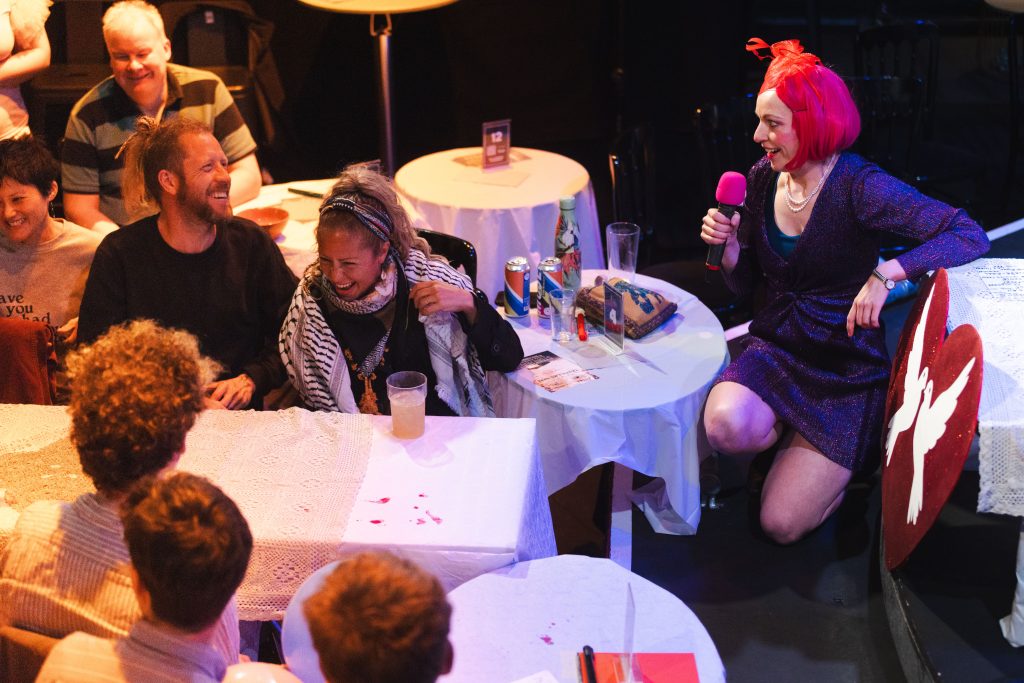
Wedding – participatory storytelling format at The Pleasance Theatre, photo by John Williams @justjohn
Storytelling and performance
We all have a story to tell – let others hear it. This workshop will draw of theatre techniques to explore:
- What makes a good story?
- What is your storytelling persona?
- How to create an engaging public performance?
Stand Up Comedy
Facilitated by a professional stand up comedian, this session will cover tips on how make people laugh:
- Being funny on stage
- How to maximise laughs and deliver punch lines for stand up
- Creating content for comedy sets
Music making and singing
Reconnect with your voice and appreciate the sounds around you.
- Explore the voice and body connection
- Learn vocal warm ups and harmonies
- Create a piece of music using your voice and found sounds
Filmmaking and video creation
Film is a powerful storytelling tool. Learn how to make your own video content by:
- Using accessible and free technology to make films
- Storyboarding, scriptwriting and screen acting
- Set, sound and lighting
Digital technology and AI
Overcome digital exclusion by better understanding of cultivating digital and creative skills. Drawing on our projects Public Voices in AI and Digital Apprentice you will:
- Explore the use AI and digital technology in your life today
- Contribute ideas for the future use of technology
- Develop and test creative ideas using accessible technology
Would you like us to run a workshop in your community?
Contact Margot and let’s explore what we can do together
07812439548
“More ways to skin a cat”: Quacktion Time, The Wedding and Heal the Net – New participatory formats at The Pleasance Theatre 24 Jun 7:35 AM (3 months ago)
At The People Speak we have many strings to our bow. In May 2025 we had the opportunity to create brand new participatory structures at the Pleasance Theatre for The Critical Conversations series commissioned by Sage and Jester production company. The aim was to involve the audience in discussing misinformation, truth and build dialogue around different perspectives. We followed our principles of creating participatory performance:
- Non-hierarchy: facilitators and participants are all equals
- Structure without content: the content is developed spontaneously by the participants using an accessible structure
- Co-creation: it is about creating performance collectively
‘Quacktion time’: using satire as a way to shed light on the truth (13 May)
We recreated the format of the talk show Question Time, with a twist! We called it Quacktion time and had participants in the audience wearing animal masks. They could channel their inner political animal and discussed serious quacktions concerning the general welfare of the burrows of London, represented by six animal panelists. Through a series of provo-cat-ions, the animals got caught in the game and discussed topics such as: which animal would be the best ruler? The duck argued that due to their ability to be on the ground, the water and in the sky, they could offer different perspectives of the world. The elephant (in the room…) claimed that it was their God-given duty to be the ruler, implying their superiority in the kingdom. The lamb explained that they occupied the moral high ground due to their sacrificial position. We invited the animals to be daring and to disrupt the expected direction of the conversation rather than focus on the dynamic of exchanging facts and demonstrating knowledge on the subject that happens on television discussion programmes. Pushing them to have provocative ideas and answers is part of The People Speak’s mentality as it’s about challenging different world views.
‘The Wedding’ – Polish wedding games for star crossed lovers: tackling the most divisive topics to become better conversationalists (19 May)
Set around a meandering table covered with white cloth, two families from different backgrounds met for a Polish wedding, where they were encouraged to get to know other family members through wedding games. Uncle Przemysław, knowing that he would miss the wedding, sent a parcel with provocative content. While playing pass the parcel, the two families discussed and confronted each other about the sensitive assertions made by our dodgy but well meaning uncle. ‘Birds aren’t real’, asserted one of the guests, but we challenged them to deal with the strong differences of opinions by seeking consensus in the name of uniting the two families together. We shared some clichéd platitudes about love and togetherness as a way to potentially soothe any deeper conflict. Platitudes, even if they are cliché, also have a universal and straightforward significance and it was interesting to see the wedding party engage with these shared truths that didn’t come from academic knowledge.
“I had my doubts that the experience would work at first to be honest, as it seemed a bit random. So I was taken aback to find just how absolutely successful it was! I had tremendous fun participating. I felt that everybody there, as the event drew on, really got into the swing. The show culminated in a way that suggested, underneath the dressing, it was ‘going somewhere’. If it was a little haphazard, even chaotic (in a good way), the organisation and ‘narrative logic’ emerged through everything as the event wore on. You had to be there” – The Wedding participant
‘Heal the Net’: questioning the balance between free speech and censorship through the notion of algorithms (20 May)
“The fun and creative approach added a new spiritual vibe to algorithms. It made me view algorithms as an ever-present ghost that is haunting our everyday life. And, this is coming from someone who doesn’t even believe in ghosts!“ – Heal the Net participant
That night, the internet was dead and we had to revive it (spoiler alert: we did!)! Led by Sister Margarita and Brother Read-the-Room, the brothers and sisters cleansed the room through ritualistic chants. Rather than using western-style appraoch to medicine, we decided to try alternative holistic techniques. We did a psychic reading of the internet with customised Taroblox cards. This set of cards represented the archetypes that we see every day on social media platforms, such as the ‘get ready with me’. Seance participants were invited to pick a Taroblox card and physically embrace the spirit of it using an evocative object (dumbells for the Gym Bunny, broccoli for the Paleo Diet Influencer etc.). As the reading progressed, participants personalised and critiqued the archetypes, by projecting their own online experience, opening doors for wider conversation about the climate, mental health, spirituality, cost of productivity and many more . That could be very different from the algorithmic archetype that they picked. A culture of over-productivity and definitions of success were invoked. One of our roles was the creative linking of ideas and it was necessary for us to focus on the trajectory and insights rather than on getting immediate results. Healing the internet with alternative medicine meant taking a longer, more laborious route and perhaps a more rewarding one.
“Taking part in the show definitely evolved my perspective on social media influence and how we’re targeted by algorithms. Also how opinions are formed, digested, and repeated by its consumers. Whilst disconnecting or minimising our footstep seems to be a solution but implementing such solutions is not as easy as it is often believed. The fun and creative approach added a new spiritual vibe to algorithms” – Heal the Net participants
Creating participation structures in the age of social media
One of our many observations about social media is that it aims to provide sharp, short and engaging content that is designed to provoke an instant emotional response. Counter to that, our formats invite tangential exploration of the subjects through intellectual and physical engagement. The punchline or the final conclusion is often deferred and completed by the other participant later on.
Changing perspectives is a process. Our formats are mostly concerned with planting the seed and creating conditions for this to begin.
That said, the translation of loose impressions and thoughts from the audience members into concrete links with the themes of the event had to happen much faster and more directly, which was challenging for the facilitators but also a great exercise in concision and synthesis of different perspectives.
“I learned that things can work out even when you think they’re not going to. So it taught me to have more belief, and be less negative and dismissive. It also taught me, as the old adage says, that there are more ways to skin a cat than one, to think laterally. There are ways of doing and going about things and finding solutions as yet undreamt of in my philosophy” – The Wedding participant
Documentation
13 May 2025
‘Quacktion Time’ photos and video
Talkaoke at Tricks, Trolls and Lols video
19 May 2025
‘The Wedding’ photos and video
Talkaoke at Truth Hurts video
20 May 2025
‘Heal the Net’ photos and video
Talkaoke at How to Cure Your Algorithm video
The creative team behind the formats
Mikey Weinkove, Margot Przymierska, Helena Bloch, Pamela Farrugia, Christopher Gerhard and Jo Elise
Part and parcel of engagemen in Pendle – 15 years of collaboration with In-Situ and Building Bridges 20 May 12:41 PM (5 months ago)
“Talkaoke is part and parcel of engagement in Pendle”
– Paul Hartley, In-Situ
The People Speak have been collaborating with In-Situ and Building Bridges for 15 years, helping the residents and stakeholders of Pendle Borough envisage a better and more connected borough of the future. As part of this ongoing project we have done a number of residencies, trained new Talkaoke hosts and produced events in the areas overlooked by the famous Pendle Hill: from Walkaoke – Talkaoke on the move, to Pendle Under The Hammer – a series of creative consultations with the residents of Colne, Nelson, Barnoldswick and Brierfield to inform the borough council’s corporate plan. Talkaoke is a regular feature of the annual Pendle Festival of Culture.
“Talkaoke helps us create the space to have challenging, difficult, fun and creative conversations with residents in Pendle. We’ve done hundreds of them in a variety of places – its mobile and flexible to fit into many scenarios. We’ve used Talkaoke in town centres, Council venues, shops, pubs, schools and colleges, outside McDonald’s and online. It’s a really effective tool for exploring all kinds of themes in our embedded work in Pendle; youth voice, climate engagement and psychology, racism, cohesion, creative careers and future of work, Covid and grief, health and wellbeing, mental health. Our ambition is to continue to train up local people who can host it within the community. It enables us to make sure our programme is relevant; we develop the ideas that come up around the table and these continually inform our practice in Pendle”
– Anna Taylor, Critical Engagement, In-Situ
Read about The People Speak blog on climate change, inequality and climate emotions as part of Climate Lab Pendle
Visualisation by Christopher Gerhardt
“The impact that Talkaoke has had on our practice overtime is immeasurable but we can see indications of it through the depth of long-term engagement overtime in place, the trust people have in the process and familiarity with this as a trusted tool by school students and Council leaders alike. It enables us to build trust and engagement when people feel heard, and enables us to explore difficult subjects like racism, misinformation and climate crisis in a democratic way that enables each person around the table to go on their own journey with that subject”
– Paul Hartley, Organisation and Development, In-Situ
In-Situ are embedding art into everyday life. Based in Pendle, they work in relationship with people and place through art and creativity. Together they are thinking about alternative futures, connectedness and greater equality.
Building Bridges a charity that aims to improve community relations and community cohesion by raising awareness and understanding amongst people about different cultures; promoting common values; and helping people to develop friendships that cross cultural and community boundaries.
Watch Pendle Under The Hammer here.
Visualisations from Digital Talking Sciety part 1 and part 2, which we hosted through the pandemic.
Watch Walkaoke, as part of Talking Society here.

 Visualisations of Pendle by Rick
Visualisations of Pendle by Rick
The Aberfeldy Stories project 2025 20 Mar 10:05 AM (7 months ago)
This Spring and Summer we are shining a light on people’s stories in our Poplar neighbourhood and beyond, through workshops in creative writing, music making, podcasting, comedy, performance, radio and storytelling.
Using our emergent approach, we are inviting you to co-design the programme with us. We want to know about your interests, skills you’d like to develop, stories you’d like to tell and ways in which to tell them. Together we will work on creating a film, a podcast series, a book, a music video, a collection of short stories, a radio broadcast, an anthem, a comedy night, a theatre performance, a guided tour… Everything is possible!
The project will begin in April 2025 with a series of podcasting workshops and more all the way through August, culminating with a big event in September 2025, where you will be able to showcase your work.
By taking part in the Aberfeldy Stories project you will:
- Gain transferable skills such as communication and public speaking
- Make new social connections in a fun and creative environment
- Discover artistic skills and passions that you didn’t even know existed in you
- Build confidence to flourish in any professional or social situation
Photo by Brian Whar
Who is the project for?
18+ residents of Aberfeldy Village and wider Tower Hamlets.
When is it?
April – August 2025 workshops, September – the showcase. Exact dates to be confirmed.
How can I join?
If you are interested or want to learn more about the Aberfeldy Stories, contact Margot on 07812439548 or email margot@thepeoplespeak.org.uk
Next event
Wednesday 30th April, 6-8pm at Aberfeldy Big Local – our monthly session with snacks and drinks, where we will develop and visualise your ideas
Monday 14th April, 11am-2pm at Aberfeldy Big Local – the Easter special Talkaoke for all ages with arts & crafts activities by ABL
Photo by Brian Whar
The Aberfeldy Stories project is made possible with funding from Aberfeldy Big Local and Arnold Clark Community Fund
Climate Encounters at the Talkaoke Table with In Situ, Lancashire 18 Feb 5:31 AM (8 months ago)
We have written a blog for our long-term collaborators In Situ on climate change, inequality and climate emotions as part of Climate Lab Pendle. In our writing we explore factors that inform people’s views and feelings about the crisis, mis and dis-information, numbness, neutrality and understanding the barriers we encounter in climate engagement work.
Read the full post here.
Visualisation by Christopher Gerhardt at the Inside Out Pendle Talkaoke, 18th Nov 2024
Are we on the same journey?
The uniqueness of our approach is that we create accessible structures that encourage participants to take control of the direction of the conversation, set the agenda spontaneously and get involved in a direct, face to face exchange of perspectives and ideas with the others sitting around the round Talkaoke table. We encourage diversity of perspectives because we believe that we have all something to learn from each other. For example, we would never deny something that a person says – even if we believe it to be factually incorrect. Our aim is not to call someone out on their lack of knowledge but rather understand their perspective and what led them to forming a particular opinion or value system. It is a simple concept, but it’s a concept which allows us to hold space for the kind of exchange that social media promised but rarely delivers. In the age of polarisation and unclear information provenance leading to mis/dis-information, we have seen that unexpected or unpopular views are marginalised or become a target of online attacks. This is why it is core for us to ensure that Talkaoke remains a space to explore all views in creative and constructive ways to better navigate the complexities of today’s challenges (…)
Is climate change part of God’s plan? Apocalypticism and climate change
On 25 June 2022 we did Talkaoke at Pendle Festival of culture in Nelson. We were talking to a group of young people about time speeding up when the conversation turned to the imminent end of the world. Time going faster is apparently a sign of the world ending. We had a long conversation about the end of the world, Judgement Day, the Dajjal (the anti Messiah) and what humans should do to prepare. Towards the end of the conversation a local councillor said that this apocalyptic talk was a tenable way to discuss the dangers of climate change for his community. Many people in Pendle have quite an apocalyptic view of the world, saying that end times are near and there are many signs that the end of the world is near. For those of the Muslim faith this can mean that your priority is to be a good muslim in the eyes of Allah come Judgement Day. Whether this means addressing the issues of climate change or not is a debated question (…)
Fat Thursday Special – Aberfeldy Live! Talkaoke 13 Feb 6:07 AM (8 months ago)
Fat Thursday for many Polish people is the last day before Lent to eat lots of fatty, sugary food – most notably – doughnuts filled with jam or ‘pączki’ in Polish ????????. We will be honouring Fat Thursday this month at our Aberfeldy Live! Talkaoke studio session – we hope we can sweet talk you to joining ????
Welcome to Aberfeldy Live! Talkaoke – our monthly interactive pop-up talk show, where you, the participants, set the agenda. Every month we report live from the streets of Poplar and further afield about all the matters local and global.
Talkaoke is an interactive talk-show, where you decide on the subjects. Just grab the mic and have your say! Each discussion is a journey from one unexpected subject to another: it can be topical, funny, deep, surreal, and everything in between. The format is simple: the Talkaoke host sits in the middle of a doughnut-shaped table and passes the mic around, inviting contributions and comments from each participant. Talkaoke host stimulates the collective imagination of the participants by expertly linking themes and opposing points of the conversation. Talkaoke is a great way to hear the latest ideas people are excited about and creatively develop new ones.
Would you like to learn Talkaoke hosting skills?
Aberfeldy Live! is a great opportunity to have a go in the middle of the Talkaoke table and learn a few facilitation tips and tricks. Sounds good? Get in touc
Knowing AI, Knowing U and AIKONIC – Public Voices in AI 15 Dec 2024 4:44 AM (10 months ago)
Was a project in collaboration with Manu Luksch & Mukul Patel (Ambient Information Systems) as part of the Public Voices in AI research program that ‘aims to ensure that public voices are front and centre in artificial intelligence research, development and policy’. We set out to understand and help articulate beliefs and concerns about AI held by two groups in Tower Hamlets: clients of Streets of Growth, a charity supporting vulnerable teenagers at risk of diverse harms, and older adult clients of mental health charity MIND.
What makes AI problematic as a technology is its opacity. The spread of surveillance cameras in the UK was visible to all, especially those that might have felt targeted. But how do you know you’ve been sorted by a system that exists across distant data centres, ‘somewhere in the cloud’? How can you understand its outputs when even its designers might not be able to fully explain them? And how can you discuss all of this with a neighbour when they see entirely different newsfeeds? Of course, the impact is greatest on those who are already vulnerable.
– Mukul Patel
‘A day in the life’ exercise to identify all interactions with technology in a typical day
Through our project we asked, where had participants encountered AI, or where did they expect to do so in the future? How could their voices on this topic be encouraged, informed, and articulated – to be heard in regulatory and policy spaces? What creative approaches would best support this?
Talkaoke with project participants and invited guests at Streets of Growth, 23 January 2025
Screening of 'Data Shadow Theatre' films at the final event at Streets of Growth, 23 January 2025
In the course of creative workshops between September 2024 – January 2025, we explored participants experiences and perspectives on technology and AI, using a range of tools and creative prompts from storytelling, sculpture, music, creative writing, performance, improvisation, drag, podcasting, filmmaking and the emergent Talkaoke talk show format. The project gave us an opportunity to evolve our existing relationships with communities in Tower Hamlets and creatively address many of the concerns around technology and the future that often arise, as well providing knowledge and insight into these fields.
Acetate drawing used in scenario-building during the workshopsThe Data Shadow Theatre in action
Project reflections and film screening at Republic London, 10 December 2024
Postcards to the Future Generation created by participants at Republic London, 10 December 2024
Through the process we came to understand that building trust and human connection in the digital world was hugely important. So was the impact of social media on shaping our identities and headspace. Participants felt a need to reclaim agency over digital tools. From our conversations it is clear that people want more control about how they interact with AI. They want the right to interact with the human behind the machine. They also want it to be clear when they are dealing with an AI and who owns and runs these systems
– The People Speak
Over each course of six workshops, the participant groups were invited to play with different media and techniques, from drawing and clay-sculpting to poetry, sound manipulation and acting. This created spaces for reflection, and generated elements that could be iterated and layered to make a complex, collaborative piece. With a final video work in mind, we needed to bring characters, sound, and plot together and encourage expression on a non-threatening stage. There’s an approach I’ve dubbed ‘Tactical Fiction’ which allows us to rethink the status quo by creating myths and tales around existing objects, processes or environments. It’s a great way for creatively challenging what we find less than perfect in our world, for combining the political with the imaginary. In this project, we realised this by first fictionalising a typical day’s encounters with AI, then developing the scenario and dialogue for a ‘Data Shadow Theatre’. Shadow-play encourages expression from even the most stage-shy participants, and the vignettes that the participants created spanned the entire gamut from the poignant to the outraged to the laugh-out-loud.
– Manu Luksch
The resulting video works are available to view here. We held two celebration events – in December 2024 at Republic London and January 2025 at Streets of Growth HQ in Aldgate, where we presented the works to an invited audience, followed by lively discussion. We aim to further develop these video works into a resource that can be used for advocacy – for bringing together citizens and communities bound by common concerns, and raising their voices into the policy, design and regulation space.
If you would like to find out more about the project, please email margot@thepeoplespeak.org.uk and mukul.works@proton.me.
We are delighted that the project was funded through Public Voices in AI through RAI UK grant reference EP/Y009800/1
Project partners
Ambient Information Systems is a practice founded by intermedia artists Manu Luksch and Mukul Patel. Their work interrogates conceptions of progress through the devising of tools and frameworks and the instigation of processes, with a strong emphasis on research and dissemination. Recent works have addressed surveillance, corporate data harvesting, and the regulation of public space, and have been shown at ARoS Art Museum (Århus), Centre Pompidou (Paris), NTT-ICC (Tokyo), and Eyebeam (New York).
Mind in Tower Hamlets, Newham and Redbridge have supported the mental health and wellbeing of our community for over 30 years. We deliver high quality mental health and emotional support, talking therapies, advocacy and employment support. We are inclusive and committed to meeting the diverse needs of our community and campaigning to eradicate stigma, discrimination and inequality.
Streets of Growth – a dynamic grassroots charity with a pioneering approach for re-engaging young adults aged 15-25 to reduce harm and transform their lives through developing safer lifestyles and lived environments, and maintaining education and career progression. Established in 2001, Streets of Growth was born out of our own lived experiences of growing up and navigating the streets and council estate realities in east London. We are a multiculturally diverse team of Intervention Coaches and Entrepreneurs, some of whom were once young recipients of these incredible services ourselves.
Project funders
The Public Voice in AI Fund is part of Public Voices in AI, which aims to ensure that public views and voices are front and centre in all uses of AI. Public Voices in AI builds, shares and reviews knowledge and understanding about public views on AI and encourages a range of AI users and stakeholders to engage diverse communities in AI uses, research, development, use and policy-making. Public Voices in AI is funded by RAI UK (which is funded by UK Research and Innovation (UKRI)). It is a collaboration between the Digital Good Network at the University of Sheffield, the Ada Lovelace Institute, the Alan Turing Institute and University College London. The project web page explains our work in more detail.
Artistic Residency with Bielefeld University – 2024 15 Dec 2024 4:30 AM (10 months ago)
Between 22 and 25 August 2024, The People Speak team – Mikey, Margot and our multilingual host Timna – joined the University of Bielefeld, Germany as part of the public relations project Ö for the CRC1646 Linguistic Creativity in Communication. Over the next 4 years the CRC aims to investigate creativity of the German language. To combine research and public relations the project is using Talkaoke – our interactive talk show format. This year we had the opportunity to run Talkaoke in 4 different contexts: from a facilitation workshop with the Linguistic PhD students to public events in an adult education centre, a festival and at a democracy event at one of the contested public spaces in Bielefeld.
22-23 August – Bielefeld University and Volkshochschule Bielefeld (VHS) We joined at a workshop held by the project Ö for PHD students interested in science communication. For some people communicating their research through face to face interaction was a familiar territory, while others found it easier to communicate with their peers through academic writing. We started out with some gaffer tape on the floor spelling: FÜR and GEGEN to understand where the group stood (literally) on the subjects such as: Flammkuchen (a local speciality and a kind of a yummy pizza base), a political dimension of science or does playfulness undermine the academic merit? Needless to say, this led us to discussions which permeated throughout the day. We talked about our approach to communication and creativity through the lens of our artistic approach and the 27 years experience of working with the collective imagination of thousands of people who got involved in our projects – not just Talkaoke but also The Slice Is Right, Who Wants To Be or Blind Update. With Talkaoke being a regular feature at many science-based events at the Festival of Genomics, Natural History Museum, Science Museum – to name a few, we understand some issues with finding a smooth communication path between the scientists and general public. In the Talkaoke facilitation training we were able to delve deeper into what makes a fruitful and engaging conversation. We zoomed in on building the bridge from the side of the participant, deep listening and tapping into creativity during a live conversation, when there is no time to prepare. The new trainee hosts had a chance to try their Talkaoke skills in a public setting at the VHS Volkshochschule Bielefeld during the open day.
More photos
24 August – Fairstival The Fairstival took place for the first time over 3 days at the idyllic Alte Wassermühle in Bentrup in Bielefeld. A swan was swimming peacefully in the pond when we arrived, and one thing was immediately clear: the Fairstival greeted us with a very relaxed atmosphere. Coming from cool England, we were sweating while setting up the Talkaoke table in the unusually hot temperatures, even for Bielefeld. As soon as our pink table was set up, exciting discussions on various topics began. At first, we talked about heat, sustainability, and climate change. Many of the participants had travelled by bike and mentioned the lack of an expanded cycling network in the city, though they also noted that the city already has many initiatives to improve life for all its residents. Next, Kim, a student at Bielefeld University, took the microphone and gracefully jumped into the pink chair to make her debut as a Talkaoke host. Participants talked about the various musicians at the Fairstival, sports, the voluntary work many were involved in, and there was also an extended discussion on different relationship models—monogamy, polyamory, or maybe something else? Everyone was free to express their opinion. It was a pleasant environment to try out Talkaoke for the first time. To wrap up the day, just before the storm swept over the city, we were able to enjoy wonderful food from Gambia, Turkey, and regional apples. Afterwards, we danced together with many festival guests to the amazing live music of Los Kamer.
More photos
25 August – Kesselbrink spielt! On our last day in Bielefeld, we were invited to the festival Kesselbrink spielt!, a celebration of German democracy. Our Talkaoke table was set up between the political party booths, and we were able to engage in various conversations with the local residents. The first discussions were initiated by frequent visitors of the square and politicians. Different opinions were voiced about what the square needed, and we were able to have many controversial discussions. It was fascinating to hear different perspectives from people of various ages, backgrounds, and political views on topics such as violence, the German school system, and why the people of Bielefeld love their city so much. The diversity of the city was reflected not only in the range of opinions but also in the variety of languages spoken. People conversed in German, English, Russian, Polish, and even French. The youngest residents of Bielefeld also shared their thoughts, enlightening the older generations on the importance of Hello Kitty, and at the tender age of 8, they expressed their opinions on bullying in schools. It was an important and refreshing round of discussions, with many exciting encounters between people of all backgrounds. Before we wrapped up with the support of some participants, Anna who had experienced Talkaoke a couple of days previously jumped into the middle of the table and gave us a splendid debut as Talkaoke host in German, Russian and with a lot of her great laughter.
More photos
Finally, we wrote a collective poem about our experience at Kesselbrink, which is now awaiting a music producer to compose some good beats for it. Kesselbrink the poem Kesselbrink Kesselbrink, it’s not what you think Dealers of opinions, high horse wink wink I can teach you how to march Knoblauch sauce contains cornstarch I will cook you what you want Pay what you want – € siebzehn euro is a start It’s a dangerous place Sitting witnessing together Remembering forever Humanity fold in on itself While we get fucked up We came here from all corners To be here on this square To finally discover what the mind is for Circulation is poor until you get a run for your money Head in the toilet bowl Gott ist tot – but wait, there’s more Incomprehensible connects with indescribables Stressed by inexplicable ‘o’ umlaut becomes a black hole Deeply philosophical divided by poetical Becomes antithetical- don’t care if it’s not ethical We can’t afford the medical Nevermind the pedicure We are so unapproachable It isn’t learned or coachable Choose a weapon for this war Knife or fork or just love more? It’s waffely poor But it’s what life’s for Menschen kommen von hier und dort Die einen meinen es es sei ihr Ort Die anderen sagen, sie sollen gleich fort Don’t like it but that’s the way it is
